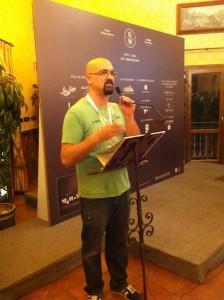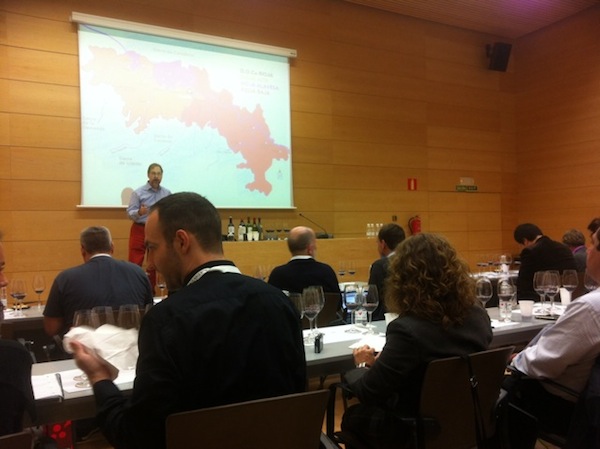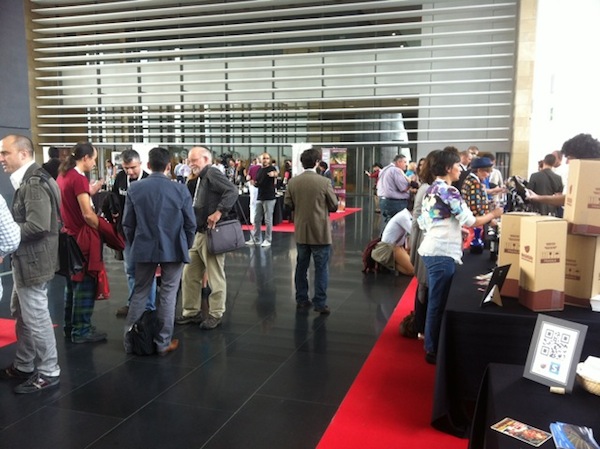“Here we are,” I thought when I got off the bus at Dinastia Vivanco Wine Museum in Rioja, Spain. “Exactly like six years ago, when everything started…” No, wait, that’s not precisely true. At that time, here in Logroño there were maybe 50 of us from a handful of countries, everybody enthusiastic about wine and new technologies, and we couldn’t wait to share their experiences with other yet-unknown friends. Today, in 2013, we are more than 250 people from 35 countries. But again with the same enthusiasm. It doesn’t matter if we are fewer or more, there is one essential for this event: an inexhaustible passion for wine. The technologies — blogs, social networks, etc. — are just tools for sharing it faster and more widely.

Launched in 2008, the European Wine Bloggers’ Conference was a very innovative event in a setting in which few people — and almost no European wineries — knew what wine blogs were. Six years later, the landscape of the web is much richer and more complex, so that the event’s name has also changed. “The change from European Wine Bloggers Conference (EWBC) to Digital Wine Communications Conference (DWCC) was driven by the fact that the event is more international than ever and not restricted just to blogging activities,” explains Robert McIntosh, who has organized the conference since its beginning — along with Ryan and Gabriella Opaz of Vrazon brand consultancy. “Digital communications are now taken for granted.” McIntosh continued. “What we want to do is to encourage innovation in the general area of wine communications around the world, because it is necessary in order for wine businesses to be successful. The DWCC will continue to be foremost about building and supporting an international community of wine communicators, and working with that community to make it more effective by providing members with support, contacts and even business opportunities.”
Officially, the 2013 theme was “Flavor” (in wine, food, etc.) and of course wine itself played a big part: the Rioja Consejo supported the whole conference, and many Spanish wineries participated in a tasting in the hall of the modern Rioja Forum. In addition, dinners were hosted in wineries, and there were and pre- and post-conference tours in different wine regions (I choose to go to Priorat and Montsant).
In this short post it’s impossible to summarize all the sessions we had during the three days of the conference: the schedule was dense with amazing tastings (I enjoyed the “Aged Rioja Tasting,” the “Kopke Old Colheitas Tasting,” and the “Wine Mosaic Great Tasting”); and with fascinating presentations given by more than 40 excellent speakers on the topics of wine tourism, online PR, selling wine, and the subjectivity of flavor (among the other things). However, there is an aspect that I would love to emphasize: the human one. The DWCC is, first of all, an experience worth living.
I asked a number of attendees for their take on the conference. “It wasn’t the first time I attended an event like this,” the German wine writer and photographer Matthias Stelzig told me. “So I knew there would be a well organized working situation. Mostly, I appreciate the open and friendly attitude of all the people who come here. And although, generally speaking, everything I heard was not exactly new, I liked many of the speeches, liked the new twist they gave to some subjects.”
“The feeling that I brought home is that the digital communicators skillfully use tools that enable them to communicate in a faster, more efficient and professional way,” said the agronomist Valeria Càrastro, who (with her friend Benjamin Spencer AIW) manages the Etna Wine School in Sicily. “And even when each of us goes back home,” she added, “We continue to meet up on the net; it’s like being in nearby rooms in the same apartment.”

Reka Haros is a Hungarian woman who runs the Sfriso winery in Italy’s Veneto region with her husband, Pier Sfriso: this was the first conference for her. “Are you satisfied with the experience; was it helpful for your work?” I asked her. She replied: “Yes, I am very satisfied. It was helpful because some of the seminars were interesting, provocative, and stimulating. I did get to meet people whom I have been following on-line, and have been admiring for their work. Having the possibility to talk to them personally and exchange views was actually something that went beyond my expectations. I got to meet new friends and have made current ones more meaningful. I enjoyed very much being on the other side — going to visit local wineries – and I did get some good insights and some good recommendations both on what I could do better and what I think I do better. I had a very good chance to compare my work with that of other wineries, and that is always very constructive.”
What was the best thing — my best memory of those three jam-packed days? “I have many flashes, but the one remains impressed in my mind is my last night in Logroño, when I had the chance to taste a very valuable Port wine from 1937, which is not even available in the market. It represents exactly what DWCC means: it is about opportunities, about meeting people, about sharing, and about learning new things. So, to me that Port incorporated all of this: a moment, a flavor, an atmosphere that stays forever.”
DWCC 2014 will be held in Montreux (Switzerland), Oct 31 – Nov 2.


